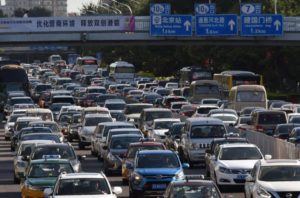01 Oct China eyes ban on fossil fuel cars, putting its own EV makers ahead of world’s auto giants
The Japan Times, September 12, 2017

Cars clog a street in Beijing on Monday. China is gearing up to ban gasoline and diesel cars, a move that would boost electric vehicles and shake up the auto industry in the world’s biggest but pollution-plagued market. | AFP-JIJI
SHANGHAI/HESSEN, GERMANY – Beijing’s announcement that it is considering banning gasoline and diesel cars from its smog-clogged roads promises to accelerate a push toward electric vehicles — a race in which Chinese carmakers have everything to gain.
The plan would follow decisions by France and Britain to outlaw the sale of such cars and vans from 2040, to clamp down on harmful emissions.
“These measures will promote profound changes in the environment and give momentum to China’s auto industry development,” Xin said in remarks broadcast by CCTV state television.
“Enterprises should strive to improve the level of energy-saving for traditional cars, and vigorously develop new-energy vehicles according to assessment requirements,” he said.
What’s it all about?
While France and Britain have said they plan to outlaw sales of new diesel and gasoline cars by 2040, Beijing has not yet set a date for its proposed ban.
But if China, the world’s largest car market, turns its back on fossil fuel cars, it could change the auto industry forever.
With annual sales of some 24 million vehicles, China is home to one in every four new cars on the planet. By 2024, analysts at AlixPartners forecast sales will climb to 42 million annually, accounting for 36 percent of the global market.
By comparison, France and Britain each record sales of some 2 million new cars per year.
“If China says no more ICE (internal combustion engine), the rest of the world will follow because the rest of the world can’t lose China’s market. It’s too big,” says Bill Russo, managing director of Gao Feng Advisory Group in Shanghai.
The proposed driving bans promise to be a hot topic of discussion at the Frankfurt International Motor Show this week, Europe’s top industry showcase.
What does it mean for China?
By law, foreign carmakers are required to team up with Chinese companies if they want to do business in the country.
With China also mulling quotas for electric vehicles — another move that could jolt the industry, traditional auto giants from Europe, the United States and Japan have no time to waste in expanding their ranges of hybrid and electric cars, experts say.
“European carmakers will have to step up their efforts in electric vehicles if they don’t want to be chased out of the market, because their current offerings are insufficient,” says analyst Stefan Bratzel, head of Germany’s Center of Automotive Management.
Electric cars only account for 1.7 percent of total sales in China at the moment, but spurred by government incentives the figure has been growing steadily and could skyrocket in coming years.
Chinese carmakers have bet big on the cleaner engines of the future, and account for 96 percent of electric vehicles sold in the country — compared to a market share of just 43 percent in the traditional car sector.
Anticipating the industry revolution, Chinese firms already dominate the production of electric motors and batteries. “This poses a real problem for the European industry,” says Laurent Petizon of AlixPartners.
The era of the combustion engine “will end on a time schedule where China can assure itself that its own domestic carmakers are capable of delivering the solution they would like to see on the road,” Russo predicts.
Good news for environment?
While pedestrians and cyclists in pollution-plagued mega-cities may breathe easier around the purring of electric cars, how “green” the vehicles are depends on how clean the manufacturing process was.
In China, fossil fuel plants with their climate-altering carbon emissions still power the bulk of the country’s factories.
Promising to clean up its act, the government has said it wants 20 percent of Chinese power consumption to come from low-emission energy by 2030, up from 11 percent currently.
In France, which derives 75 percent of its energy from nuclear power, a massive switch toward electric cars would theoretically translate in a significant reduction of harmful carbon emissions.
Any electric car boom will also bring scrutiny to the environmental footprint of battery production, from the extraction of raw materials like lithium to the complex recycling of toxic components.



Sorry, the comment form is closed at this time.